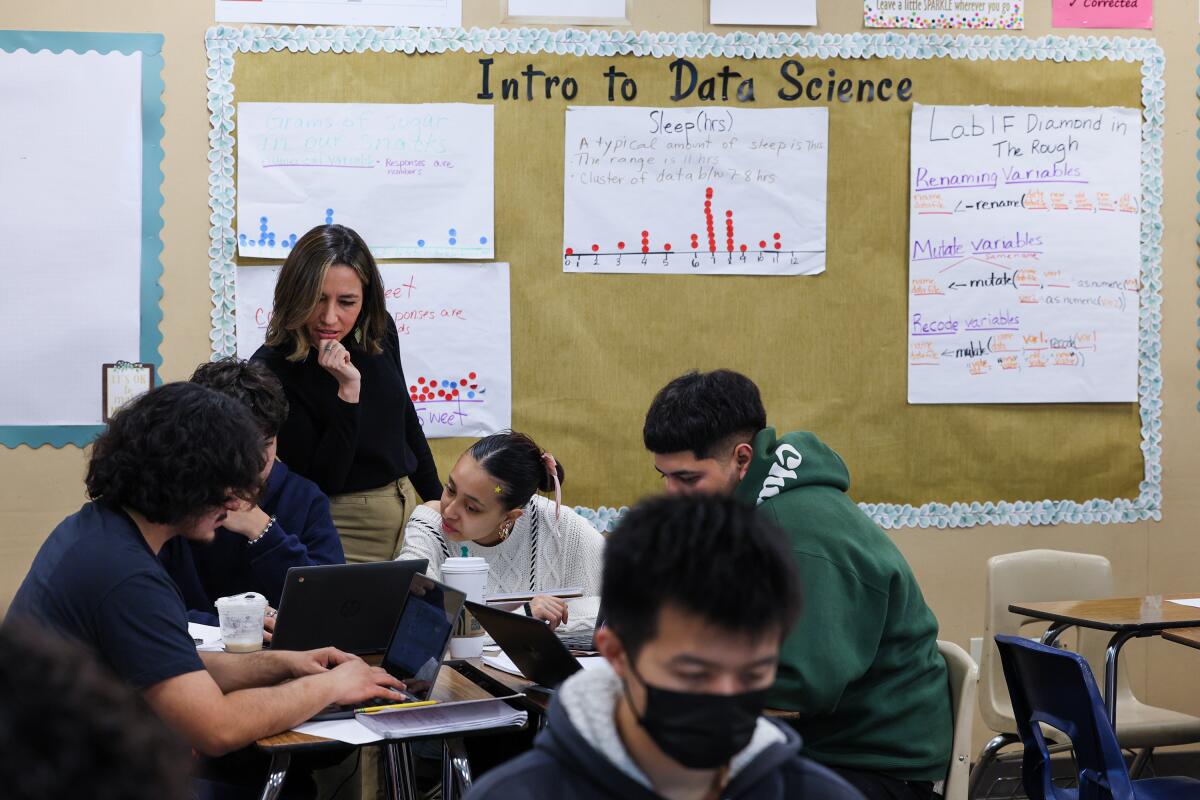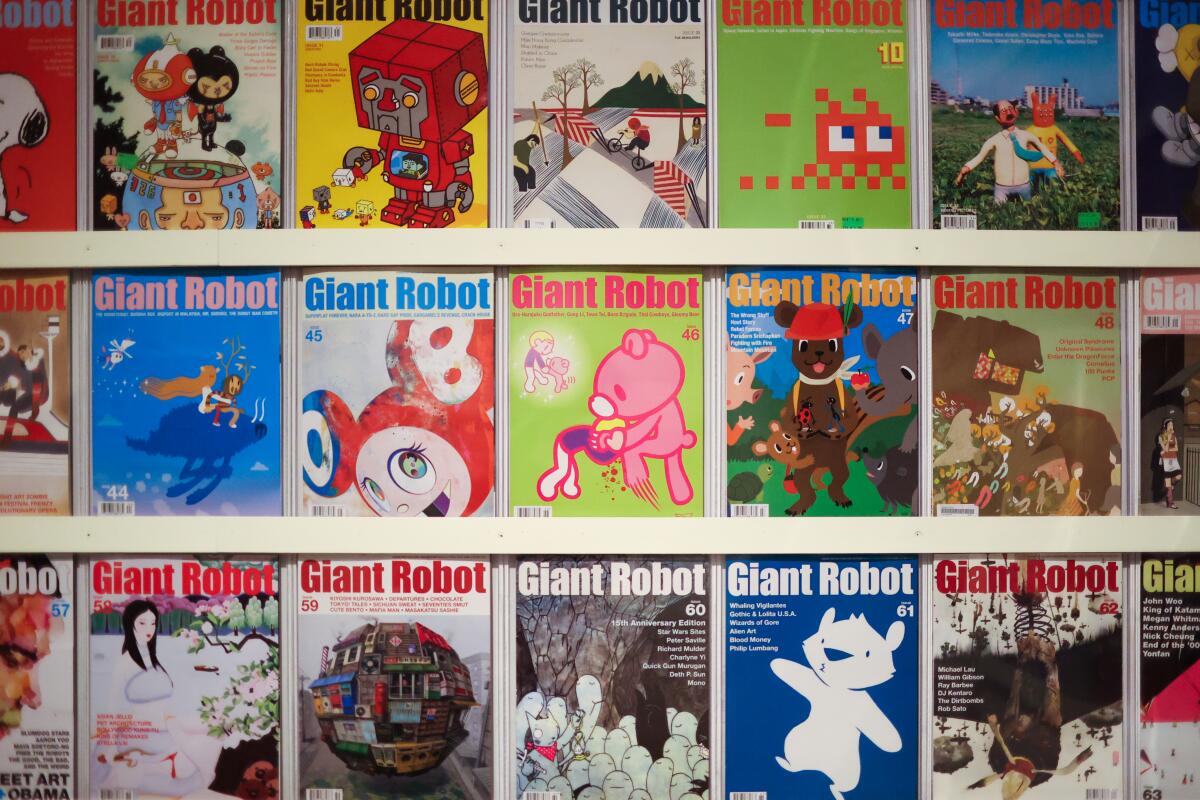How much algebra do students need to succeed in college? UC stirs furious debate

- Share via
Good morning. It’s Wednesday, March 27. I’m Teresa Watanabe and I cover higher education. Here’s what you need to know to start your day.
- How much algebra do students need to succeed in college?
- Shohei Ohtani leaves unanswered questions after blaming his interpreter in the gambling scandal.
- A celebrated Persian pop-up finds a permanent home in Silver Lake.
- And here’s today’s e-newspaper
Sign up for Essential California
The most important California stories and recommendations in your inbox every morning.
You may occasionally receive promotional content from the Los Angeles Times.
How much algebra do students need to succeed in college?
How many of you have taken algebra 2 and needed those skills to succeed in college? That question is at the heart of a huge debate about what high school math skills are needed for admission to the University of California and California State University.
What triggered the furor was UC’s decision to reverse the university’s approval of three high school data science courses to substitute for algebra 2. Both UC and CSU require students to take three years of math — algebra, geometry and algebra 2, or their equivalent integrated math courses — to qualify for admission. They also recommend a fourth year of advanced math.
I’m guessing that nearly all of you who attended a four-year university took algebra 2. The course is important not only for college-bound students. Some school districts require three years of math for high school graduation, including Los Angeles Unified.
Only 44% of California high school students complete two semesters of algebra 2, according to UC, so educators have been looking to widen math pathways with other courses.
UC had approved the first data science course, developed by UCLA, to substitute for algebra 2 at an LAUSD school back in 2013. UC’s decisions on what courses count as college-prep coursework are binding on CSU.
The back story on what led to the turnabout is a bit convoluted, but bear with me.
The data science courses began drawing particular scrutiny — with questions about their mathematical rigor — around 2020. That is also about the time when work began on revising statewide guidelines for math education, known as the California Math Framework.
Also in 2020, an administrator in the UC office that approves college-prep courses organized an ad hoc committee that recommended data science be formally approved as a substitute for algebra 2. The UC faculty board that oversees admission approved the recommendation in October 2020.
The ongoing work over the California Math Framework later brought the issue to a head. The first draft of the framework was released in early 2021, strongly advocating for data science courses and specifically mentioned UC’s decision to approve them to substitute for algebra 2. A lot of educators pushed back, including the CSU Academic Senate, which issued a resolution in March 2023 saying the courses weren’t rigorous enough to count for admission.
In July 2023, state education officials prepared to vote on the new math framework that included data science as an alternative pathway endorsed by UC. Amid ferocious lobbying on all sides, the UC faculty board voted to reverse that decision.
A working group, appointed to delve into the issues, affirmed the turnabout last month and UC then notified high school counselors.
The controversy has unleashed furious debate over what high school math skills are needed to succeed in college — and how best to deliver them equitably to a diverse range of students. Some equity advocates argue that alternative math pathways are necessary for students who struggle with algebra and don’t plan to major in STEM fields.
There are racial disparities in algebra 2 performance, with Asian American and white students earning the highest grades. There are also differences in the share of 12th-graders who advance to calculus, with Asian Americans at 25%, white students 13%, Latinos 7% and Black students 5%, according to a February 2023 report by the Policy Analysis for California Education.
But many STEM professionals, including those of color such as UC Berkeley professor Jelani Nelson, argue that the solution is to teach algebra 2 in a more engaging way — not assume students can’t learn it and give them an out. All students should be equipped with advanced algebra skills, they say, and not tracked into set pathways at such young ages.
When I began reporting this story, I confess I had to drop into Khan Academy’s online math classes to re-familiarize myself with what key concepts define algebra 2: polynomials, logarithms, exponential models. It’s been decades since I took high school algebra trig. I don’t remember needing long equations with multiple variables to get through college or work as a journalist. Did I actually need those math skills?
When I visited San Gabriel High School, a lot of students wondered the same thing. They were students in a data science class — and they were having a blast. The question of the day was whether the difference in survival rates of men and women in horror slasher films was due to chance; the students analyzed data files and used coding to find the answer.
Some students said they hated math, didn’t get algebra and couldn’t see how it would help them. They excitedly talked about how fun it was to collect real-life data for their labs, such as sleeping hours, stress levels and snack consumption.
The labs changed lives, with one student saying she was horrified to learn how much sodium she ate in her daily snacks of Takis and Flamin’ Hot Cheetos.
Another student who was also taking calculus said he believed algebra 2 was essential for STEM careers — which he planned to pursue — but questioned the subject’s necessity for other fields.
But Jennifer Chayes, dean of UC Berkeley’s new College of Computing, Data Science and Society, told me that “thousands” of students change their minds about majors and all students should have advanced math preparation to keep their options open. Other experts reminded me that understanding, for instance, the trajectories of COVID-19 or wildfire spread, retirement fund growth, mortgage interest and other real-life situations requires algebraic understanding.
The UC working group will complete its report in May about what content is needed to qualify as advanced math for UC and CSU admission. Experts say data science courses most likely can be crafted to meet whatever requirements are laid out. The question is how.
Stay tuned.
Read more of Teresa’s story here: UC stirs furious debate over what high school math skills are needed to succeed in college
Today’s top stories

Diddy’s sex-trafficking investigation
- Sean ‘Diddy’ Combs faces a sweeping sex-trafficking inquiry: What the feds have and need to prove.
- Sean ‘Diddy’ Combs’ L.A. and Miami homes are raided in a sex-trafficking inquiry, sources say.
- Cuba Gooding Jr. added as co-defendant in Lil Rod’s lawsuit against Diddy.
- A timeline of allegations against Sean ‘Diddy’ Combs.
The Shohei Ohtani interpreter gambling scandal
- Shohei Ohtani is baseball’s golden ticket. How will the gambling scandal impact his brand?
- How the saga of Shohei Ohtani and his interpreter unfolded – and why it’s not over.
- Shohei Ohtani leaves unanswered questions after blaming his interpreter in the gambling scandal.
- What to know about the Shohei Ohtani interpreter gambling scandal.
- Dodgers players surprised by Shohei Ohtani’s composure: ‘Betrayal is hard.’
- Who is Ippei Mizuhara, Shohei Ohtani’s interpreter fired amid gambling accusations?
‘Quiet on Set’ documentary
- Nickelodeon stars from ‘Quiet on Set’: Where are they now?
- ‘Quiet on Set: The Dark Side of Kids TV’: 6 key takeaways from the documentary.
- Commentary: ‘Quiet on Set’ allegations forced Dan Schneider to speak up. Now, more should.
More big stories
- The Supreme Court justices are skeptical of imposing new limits on the dispensing of abortion medication through pharmacies or by mail.
- Need help with missed mortgage payments in California? Apply soon: Money is running out.
- The standoff at Gate 36: Texas sends in the troops to block migrants from seeking asylum.
- The search has been called off as six people who plummeted from a Baltimore bridge are presumed dead.
- Would California bridges stand up to a direct hit? We asked experts.
- RFK Jr. names California tech lawyer Nicole Shanahan as his vice presidential choice.
- Drug-testing kits to be offered to patrons in California bars this summer.
- Feeling lucky? California Powerball, Mega Millions climb to nearly $2 billion in combined prizes.
- This California congressional race is currently divided by one vote.
- Party girls, karaoke, extortion in Koreatown: Trial exposes dark world.
- UC Berkeley parents hired private security, fearing for their kids.
- How bashing California became a requirement for conservative politicians.
- The LAPD trains foreign police. Does that enable human rights violations?
- ‘Humbling, and a bit worrying’: Scientists fail to fully explain record global heat.
Get unlimited access to the Los Angeles Times. Subscribe here.
Commentary and opinions
- Michael Hiltzik: The FDA shoots itself in the foot by settling a groundless lawsuit over its ivermectin warnings.
- Editorial: The humanitarian aid Gaza needs most is a cease-fire.
- Sammy Roth: Extreme heat is deadly. Californians need to pay up to protect themselves.
- Editorial: On medication abortion, the Supreme Court may actually do the right thing.
- Harry Litman: Trump just got a break in one case against him. But his luck was running out in another.
- Mark Z. Barabak: She can’t stand Trump or Biden. Don’t tell this ‘double-hater’ she’s crazy voting for someone else.
Today’s great reads

At a boy’s funeral, a Palestinian village gathers to bid farewell. Each death is different, each family’s grief unique, but the rites for 10-year-old Amro capture the emotions and sorrow in a region where it seems neverending.
Other great reads
- The Conga Room welcomed Latin luminaries for 25 years. Why club founders say it’s time to let it rest.
- Meet Clarice Akunwafo, future surgeon and USC’s defensive hero in NCAA tournament.
- The wisdom of masa in pastry: Baking new techniques for a millennial ingredient.
- A beloved Beverly Hills burger joint mysteriously closed 27 years ago. What happened?
- With ‘Palm Royale,’ Bruce and Laura Dern are (finally) father and daughter on screen.
How can we make this newsletter more useful? Send comments to essentialcalifornia@latimes.com.
For your downtime

Going out
- 🖼️ With “Giant Robot Biennale 5,” on view at the Japanese American National Museum through Sept. 1, West L.A. native Eric Nakamura flashes back to his scrappy DIY days and showcases creatives who’ve been a part of his art ecosystem from the past to present day.
- 🍽️ A celebrated Persian pop-up finds a permanent home in Silver Lake.
Staying in
- 📺 A model of restraint, ‘A Gentleman in Moscow’ is unlike anything else on television.
- 🧑🍳 Here’s a recipe for classic pound cake.
- ✏️ Get our free daily crossword puzzle, sudoku, word search and arcade games.
And finally ... a great photo
Show us your favorite place in California! We’re running low on submissions. Send us photos that scream California and we may feature them in an edition of Essential California.
Today’s great photo is from Times contributor David Vassalli at the three-story, 1,100-square-foot Aluminaire House, the newest and oldest structure designed by Albert Frey in Palm Springs.
Have a great day, from the Essential California team
Teresa Watanabe, reporter
Kevinisha Walker, multiplatform editor
Stephanie Chavez, deputy metro editor
Check our top stories, topics and the latest articles on latimes.com.
Sign up for Essential California
The most important California stories and recommendations in your inbox every morning.
You may occasionally receive promotional content from the Los Angeles Times.








